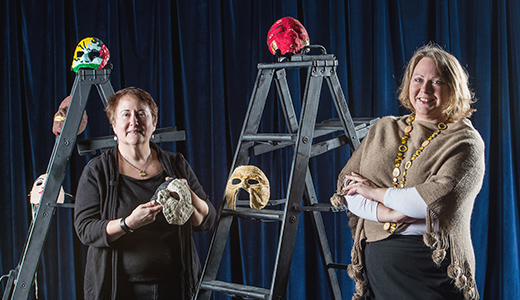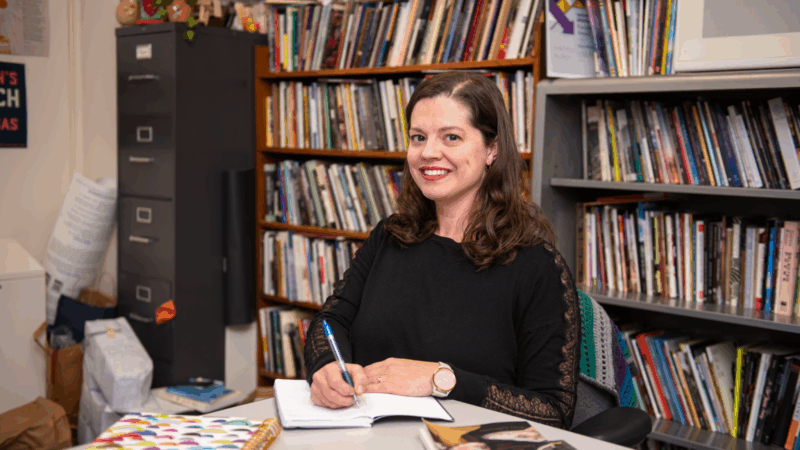Emily Trube, KSU graduate student in theater, uses drama therapy to help others
It’s not often your work finds you, but for Emily Trube, graduate student in the Kansas State University drama therapy program, that’s exactly what happened.
Trube graduated from New York University Tisch School of the Arts with a degree in acting in 1995. She worked at a theater in New York until around 9/11.
“I decided I needed to do something with my life that would be of greater service to others,” Trube said. “The reports from 9/11 were mostly on the radio, so I decided to go into radio to be a reporter.”
Trube moved back to Texas, where she had grown up, and worked as a news reporter for 13 years. During her time as a reporter, Trube found a therapist who used improvisation in a drug treatment facility.
“I went to his group, the participants let me sit in, and afterward I asked, ‘What is the name for what you are doing?’ He said he didn’t know, so I said, ‘Let’s find out!’ That is how I found drama therapy,” Trube said.
Trube is now in her second and final year in the drama therapy program at K-State. K-State’s School of Music, Theatre and Dance offers the only master’s-level theater program with a concentration in drama therapy in the Midwest. There are only four other programs in the United States.
Sally Bailey, director of the K-State Drama Therapy program, said the inter-disciplinary field of theater and psychology offers students the opportunity to work with different populations of people.
“Drama therapy works from a strengths-based perspective. We don’t categorize people by their deficits, because in theater, you think in terms of each character as a unique individual, and a drama therapist thinks of each one of his/her clients as a unique individual with gifts,” Bailey said. “Through that perspective, they are able to learn to function in the world so much better.”
Bailey said the lower tuition from being a public university has helped the program stay afloat, but funding has and continues to be a challenge. To help the program grow, Bailey said she lobbied for the last 10 years to get a second full-time professor. The program hired Dr. Melissa Briggs as a full-time assistant professor in 2018.
The program is now up for accreditation by the North American Drama Therapy Association, the official credentialing organization.
In fall 2018, Trube completed her required master’s project by directing K-State’s production of “The Curious Incident of the Dog in the Night-Time,” whose main character is probably on the autism spectrum.
“What attracted me to the piece was the way in which it was written, and the fact that it’s very solid,” Trube said. “And I like the fact that the word ‘autism’ is never used. That’s kind of the point.”
One of the requirements for the master’s project is the implementation of drama therapy, which Trube said she interpreted as including a psychological element.
“I presented what they call a relaxed performance, sometimes it’s called autism-friendly or sensory-friendly performance, so that people who experience the world in the same way the central character, Christopher, experiences the world would feel at home seeing this story,” Trube said.
This was the first-ever relaxed performance done by K-State Theatre. From the lighting, the sound, the lobby, the spacing between seats and the addition of a relaxation area, Trube said everything was taken into consideration when creating the relaxed performance.
The show ran four times, with the last show being the relaxed performance. All shows were open to the public, inviting the Manhattan community to experience the final show as well.
Trube said she is writing a paper for her project that will be a sort of manual for how to do other relaxed performances for K-State Theatre in the future.
“Some people prefer a little less sensory input, for whatever reason,” Trube said. “It’s a good option to have.”
While Trube came in knowing she wanted to eventually work at an addiction recovery center, she said the theme during her time in the program is opportunity.
“You can put something in, and you will get things out of it you didn’t even know were possible to get out of it,” Trube said.
In addition to the opportunities, Trube said Professor Briggs’ knowledge and experience helped her to realize she needed to be more plugged in and informed about addiction recovery.
“The psychology courses here are fantastic, but making that bridge and the connection to this discipline is something that last year I had to try to do on my own,” Trube said. “This year, it’s kind of laid out. This is how you connect it. This is what this is about.”
After graduation, Trube plans to move to Kansas City and get licensed as a professional counselor by pursuing a degree in addiction counseling. Trube also plans to continue to work at getting registered as a drama therapist.
“If I can come in with the license as an addiction counselor, my method is drama therapy,” Trube said. “That way I can get in the door. Sometimes you just have to find a way to get in the door.”
Drama therapy, explained
- It is a creative arts therapy that incorporates the use of drama and/or theater to achieve therapeutic goals.
- It is rooted in multiple disciplines including theater, psychology and anthropology.
- Drama therapists can practice in individual and group settings.
Drama therapists can practice in:
- Mental health facilities
- Schools
- Hospitals
- Substance abuse treatment centers
- Adult day-care centers
- Correctional facilities
- After-school programs
- Shelters
- Adolescent group homes
- Nursing homes
- Private practice settings
- Corporations
- Theaters
- Housing projects
- Medical schools
- Training organizations





